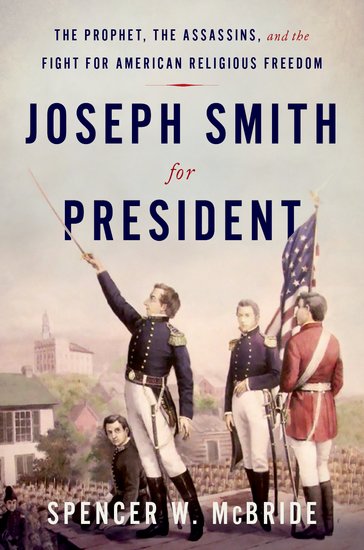ONE OF DONALD TRUMP’S first jolts to the country arrived in December 2015 when, as the Republican frontrunner, he called for a “total and complete shutdown of Muslims entering” the United States. A day later, The Church of Jesus Christ of Latter-day Saints — colloquially known as the Mormons or the LDS Church — put out a press release emphasizing their political neutrality but not “in relation to religious freedom.”
They cited two documents from the church’s early years. One was an 1841 ordinance in Nauvoo, Illinois, promising “equal privileges” to all “religious sects and denominations.” And the other was the founding prophet Joseph Smith stating a willingness to “die in defending the rights” of “a good man of any denomination.”
Joseph Smith for President: The Prophet, the Assassins, and the Fight for American Religious Freedom by Spencer W. McBride evaluates this long discussion of American religious heterodoxy through the lens of Smith’s longshot bid for the White House in 1844.
Insular and devoted to a single charismatic figure, early members of the LDS Church did not, according to their suspicious Protestant neighbors, behave like a real religion and did not warrant the protection due to one. In Missouri, supporters of slavery grew enraged when a Mormon press published an article that smacked of abolitionism. Mobs rallied and attacked Mormon towns and settlements, burning homes and killing many.
Smith and his followers fled over the Mississippi River into Illinois, where they founded a theocratic town called Nauvoo (Hebrew for “beautiful place”) with vast independence in judicial matters. This alarmed nearby citizens, who watched Smith amass great power as he moved through a constellation of civic and military offices, including mayor. Something had to be done.
Anti-Mormon mobs followed the same pattern. First, the aggrieved neighbors would build a public case, often in the press, as to why Latter-day Saints were really a group of fanatics masquerading as a faith. Newspapers as far away as Massachusetts and New York ran lurid stories casting the group as a threat to democracy and therefore in need of violent suppression. Their prophet claimed his revelations were binding on all humanity, and his followers voted as a bloc for whomever Smith supported. Starting in 1842, disillusioned ex-Mormons began publishing stories accusing church leaders of practicing polygamy.
